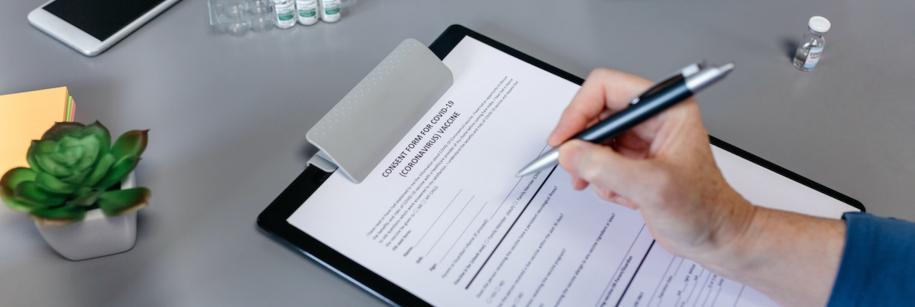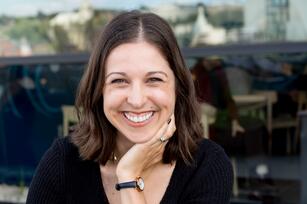
Breadcrumb
- Essential Partners
- Our Impact
- News and Notes
- Having a Better Conversation About COVID Vaccination
Having a Better Conversation About COVID Vaccination

“As long as we're engaging in toxic, polarized, zero-sum debates about COVID-19 vaccinations, we're going to struggle to build effective policies and public trust, both of which are needed for public health.”
In workplaces and living rooms across the country, people are having hard conversations about the Covid-19 vaccine. As we navigate the turn from pandemic to endemic, we'll need to keep having these conversations for the foreseeable future.
High-stakes conversations like these can unravel quickly. Wrong words or bad assumptions can thrust a relationship into repetitive cycles of defensiveness, mistrust and antagonism. If you've ever seen Thanksgiving dinner devolve into a shouting argument about politics, you know what this looks like—and you know how painful it can be, not only for the people involved but for a whole community.
The conversations we have in private are also microcosms of our public discourse, where some people bemoan "anti-vaxxers" who "don't believe in science" while unvaccinated people who are anxious about the government or the medical system might feel that their concerns aren't being heard at all. This dynamic serves no one. It generates even more mistrust and makes us no safer or healthier.
How do we do better? We can begin by drawing out the individual experiences that lie beneath a person's values and perspectives. The intricacy and subtlety of a person's own story can interrupt these toxic cycles—without asking anyone to compromise their core beliefs.
Let me offer two pairs of examples to help illuminate this idea.
I have a friend who got pregnant during Covid-19. Weighing the risks and benefits with her doctor, she chose not to get vaccinated. She and her partner had struggled with fertility for so long, they were terrified to complicate the pregnancy. Another friend, with the same basic background and the same information, got vaccinated the second she was eligible after getting pregnant. She was terrified of complicating an already high-risk pregnancy with Covid-19.
These two friends began, more or less, in the same place. They arrived at different decisions through a series of values-based choices. They made the best decisions they could at each step, trying to protect themselves and their pregnancies.
I have another friend who has a compromised immune system. After the vaccine was approved, she drove for 10 hours from Colorado to Kansas to get vaccinated—it was the closest available appointment. Yet another friend, with a congenital kidney disorder, has yet to get vaccinated. The doctor said that they truly could not predict the side effects of the vaccine, or its effectiveness, for people with the disease. Balancing the risks, they decided that it is safer to follow other precautions, like masking. Now my friend is worried that, at some point, they'll be mandated by their employer or by the government to get it anyway.
These and many, many other individual stories explode the public debate over vaccinations, which oversimplifies the decisions people face and villainizes those who disagree with you. Few people would enter honestly into a conversation where they expect to be demeaned. Those conversations are pre-determined to fail—they fail to persuade, they fail to make us all safer, they fail to sustain our relationships and communities.
As long as we're engaging in toxic, polarized, zero-sum debates about COVID-19 vaccinations, we're going to struggle to build effective policies and public trust, both of which are needed for public health.
We can begin to change the national conversation by having better conversations about vaccination in our private lives. It's not easy, but it's not impossible. If you want to engage in a deeper, more meaningful dialogue about vaccines, especially with someone who might disagree with you, here are three questions to ask yourself before you start the conversation:
- What is my goal for this conversation? Before you dive in, make sure you have a goal that the other person would sign up for. Instead of trying to change a person's opinion, try to learn more about the values or personal experiences behind their choice. Or enter with the goal of helping them feel heard and seen, especially if they're in the minority in your community. You may find that the conversation leaves you both changed in ways you couldn't predict.
- Where do I feel conflicted and where does my thinking defy expectations? Most people hold nuanced views about the issues that matter most to them, but rarely get to share those perspectives in all their complexity. Start by thinking about the areas where your own view is less clear or certain than people might assume. Decide what you're willing to share. Maybe you have mixed feelings about bodily autonomy and mandates, or you don't completely trust pharmaceutical companies, or you worry about spreading Covid unknowingly. Opening up about your own reflections, feelings and values will make it possible for other people to do the same.
- How can I ask a question that invites a personal story rather than an opinion? Questions can open people up or close them off. Try to ask questions that invite a personal story or experience, or to share what's at the heart of the matter in regards to their perspective. Ask questions like: "What do you wish people understood about your decision?" or "What in your decision most resonates with a value about how you want to live your life?"
People are always changed by what they hear in a deeper, truer conversation with someone else in their community—even if their view or choice remains the same as it was at the start. There is no way to know the outcome of a genuine, open, curious conversation until you actually have one.
But one thing is certain. Without better conversations, without interrupting the toxic cycles of polarization, we will not be able to meet the challenges that face our communities today. Better conversations are crucial if we are to live and work in community, to thrive in community and to survive as a democracy. If nothing else, the Covid-19 pandemic has reminded us all that our futures are intertwined.
This article first appeared at The Fulcrum and has been syndicated widely.
